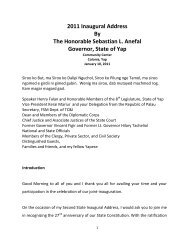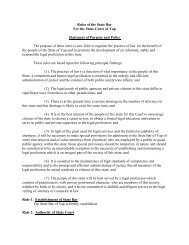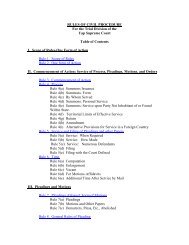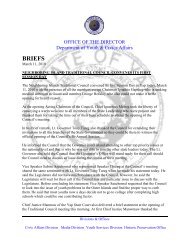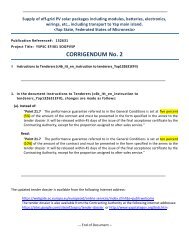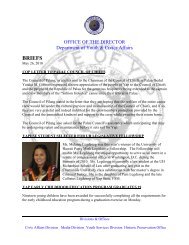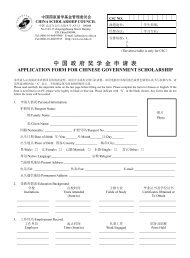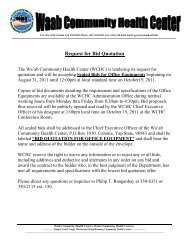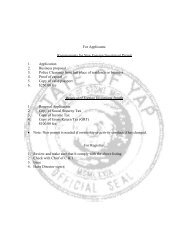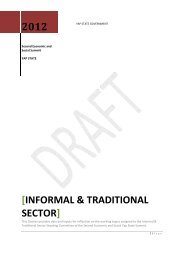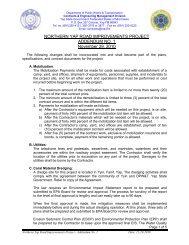1 2010 STATE of the STATE MESSAGE by GOVERNOR ...
1 2010 STATE of the STATE MESSAGE by GOVERNOR ...
1 2010 STATE of the STATE MESSAGE by GOVERNOR ...
You also want an ePaper? Increase the reach of your titles
YUMPU automatically turns print PDFs into web optimized ePapers that Google loves.
<strong>2010</strong> <strong>STATE</strong> <strong>of</strong> <strong>the</strong> <strong>STATE</strong> <strong>MESSAGE</strong><br />
<strong>by</strong><br />
<strong>GOVERNOR</strong><br />
SEBASTIAN L. ANEFAL<br />
January 29, <strong>2010</strong><br />
Acknowledgments<br />
Mr. Speaker and members <strong>of</strong> <strong>the</strong> Seventh Legislature <strong>of</strong> <strong>the</strong> State <strong>of</strong> Yap, and most <strong>of</strong><br />
all, <strong>the</strong> People <strong>of</strong> <strong>the</strong> State <strong>of</strong> Yap: I am most honored to communicate to <strong>the</strong><br />
Legislature today my third annual State <strong>of</strong> <strong>the</strong> State Message. In <strong>the</strong> same vein, Mr.<br />
Speaker and members <strong>of</strong> <strong>the</strong> Seventh Legislature, I <strong>of</strong>fer due recognition and pay my<br />
respect to <strong>the</strong> Council <strong>of</strong> Pilung and Council <strong>of</strong> Tamol, <strong>the</strong> State Judiciary and <strong>the</strong> entire<br />
leadership <strong>of</strong> Yap in <strong>the</strong> delivery <strong>of</strong> this Statement concerning <strong>the</strong> state <strong>of</strong> affairs <strong>of</strong> <strong>the</strong><br />
State <strong>of</strong> Yap. In remembrance <strong>of</strong> all <strong>the</strong> state leaders, who have in recent years<br />
departed us, I <strong>of</strong>fer <strong>the</strong>m special tributes and ask thy Lord for His blessings on <strong>the</strong>ir<br />
souls and His wisdom and guidance for <strong>the</strong> state leadership.<br />
Introduction<br />
At <strong>the</strong> outset, Mr. Speaker, I beg your indulgence if at any given point this message<br />
should seem a bit tedious, if not wearisome. However, I am sure you would appreciate<br />
not just <strong>the</strong> importance <strong>of</strong> sharing <strong>the</strong> few milestones <strong>of</strong> <strong>the</strong> past year period, but<br />
perhaps equally important for us is <strong>the</strong> need to take a closer glimpse at <strong>the</strong> current<br />
condition <strong>of</strong> <strong>the</strong> State <strong>of</strong> Yap and <strong>the</strong> challenges confronting us now and those ahead <strong>of</strong><br />
us while maintaining a steady forward movement in <strong>the</strong> same breath. Moreover, <strong>the</strong> rest<br />
<strong>of</strong> our people are eager to know <strong>the</strong> current state <strong>of</strong> affairs, listening and eying for<br />
tangible development changes as well, and so it may not serve justice to anyone if I<br />
were to zip through so quickly.<br />
In this Message, <strong>the</strong>refore, I attempt to provide an overview, which in some cases<br />
include short synopsis <strong>of</strong> what each <strong>of</strong> <strong>the</strong> main sectors has done up to <strong>the</strong> time being.<br />
Since assuming <strong>of</strong>fice a little over three years ago, quite a number <strong>of</strong> significant issues<br />
have come our way although more than two third <strong>of</strong> such issues were inherited from <strong>the</strong><br />
prior years <strong>of</strong> stagnation. As such, I have herein highlighted <strong>the</strong> main issues and<br />
provided a snapshot <strong>of</strong> how we have countered some <strong>of</strong> <strong>the</strong>m in <strong>the</strong> past year, and<br />
suggested how we might mitigate certain pending and unexpected challenges in <strong>the</strong><br />
days and months to come.<br />
More importantly, however, I have spent a bit more time on trying to capture what this<br />
Administration believes are issues <strong>of</strong> high priority concern, which have and are likely to<br />
continue taking up much <strong>of</strong> our effort and energy today and <strong>the</strong> many days ahead.<br />
1
State <strong>of</strong> <strong>the</strong> State<br />
Ladies and Gentlemen, a review <strong>of</strong> <strong>the</strong> state <strong>of</strong> affairs <strong>of</strong> our State must first take into<br />
account <strong>the</strong> global economic crisis that has reached our shore. Like <strong>the</strong> FSM’s major<br />
international and regional partners, <strong>the</strong> State <strong>of</strong> Yap has been and is still experiencing<br />
<strong>the</strong> adverse impacts <strong>of</strong> this economic turmoil. The recent international financial meltdown,<br />
in conjunction with an earlier fuel crisis and a continuing food crisis, has placed<br />
our islands in a state <strong>of</strong> economic crisis. In addition, climate change, compounded <strong>by</strong><br />
H1N1, has continued to threaten food security, if not our very existence. The global<br />
economic recession and <strong>the</strong> outbreak <strong>of</strong> H1N1 were <strong>the</strong> apparent culprits behind <strong>the</strong><br />
declines <strong>of</strong> <strong>the</strong> number <strong>of</strong> tourist arrivals in Yap in 2009.<br />
This global recession is intensified <strong>by</strong> our own nation-wide recession, which has been<br />
on-going since 2005. The average income <strong>of</strong> our people has declined during this period.<br />
This decline is an indication <strong>of</strong> not only lower wages, but also <strong>of</strong> lost jobs as a good<br />
number <strong>of</strong> <strong>the</strong> FEMA-funded projects has been completed. While figures are not yet<br />
final, it is projected that this economic crisis will continue this year and into <strong>the</strong> near<br />
future.<br />
These recessions have left our island state with potentially unprecedented financial<br />
challenges. For example, <strong>the</strong> state (CIP) investment in <strong>the</strong> Monetization Program with<br />
<strong>the</strong> FSM National Government had lost a staggering estimated value <strong>of</strong> $8.7 million in<br />
FY08, but gained an estimated amount <strong>of</strong> roughly $4.4 million in FY09 (period <strong>of</strong> Oct. 1,<br />
08-Sept. 30, 09), discounting what we have tapped for government operation cost. The<br />
short story is that our reserve has not only lost its value, but it has lost it strength; thus,<br />
<strong>the</strong> financial health <strong>of</strong> <strong>the</strong> government has deteriorated from what it was once.<br />
In addition, <strong>the</strong> banking sector has shown an overall slowdown in commercial lending<br />
and a reduction in consumer spending. In <strong>the</strong> 2008-2009 period, consumer loans<br />
nation-wide decreased <strong>by</strong> $1.3 million and development bank loans decreased <strong>by</strong> $1.5<br />
million. No doubt, this is a mirror reflection <strong>of</strong> banking sector activities in Yap as well.<br />
These trends are likely to continue several years to come.<br />
Moreover, <strong>the</strong> economic crisis is having major impacts on every aspect <strong>of</strong> <strong>the</strong><br />
population’s everyday life, and its consequences are felt both in <strong>the</strong> work environment<br />
and in <strong>the</strong> households. Burdened with money devaluation, declines in tourism receipts<br />
and reductions in <strong>the</strong> value <strong>of</strong> remittances and international investments, more Pacific<br />
countries are facing difficulties in <strong>the</strong> economic downturn, and Yap is no exception.<br />
Coupled with <strong>the</strong>se challenges, <strong>the</strong> buying power <strong>of</strong> <strong>the</strong> dollar has also greatly<br />
diminished.<br />
Poverty throughout Yap perhaps does not necessarily mean hunger or destitution, but<br />
ra<strong>the</strong>r <strong>the</strong> continuous struggle to meet essential daily living expenses in <strong>the</strong> world <strong>of</strong> a<br />
cash economy, particularly for those who require cash payments. Now, even families in<br />
2
<strong>the</strong> most rural or outer islands have to find cash for nearly every day needs. Cash is<br />
needed for bus fares, school fees, bills, food stuffs, medicines and essential goods. It’s<br />
becoming harder and harder to get to <strong>the</strong> end <strong>of</strong> <strong>the</strong> month.<br />
Despite <strong>the</strong> existing social protection policies and our traditional practices and cultural<br />
values, <strong>the</strong>re are more and more families suffering from hardship in this island region.<br />
Lacking sufficient funds, governments too <strong>of</strong>ten opt for <strong>the</strong> worst solution <strong>by</strong> cutting<br />
social expenditure. And not supporting <strong>the</strong> vulnerable in <strong>the</strong>se times <strong>of</strong> global economic<br />
crisis can only lead to even longer lasting consequences on <strong>the</strong> well being <strong>of</strong> <strong>the</strong><br />
population.<br />
Sadly, no citizen has been left untouched <strong>by</strong> this current global economic crisis. And<br />
<strong>the</strong>re are no quick and easy fixes to <strong>the</strong> recession plaguing our economy. Indeed, it is<br />
likely to get worse before it gets better.<br />
We now face a financial storm <strong>of</strong> unparallel magnitude. It is <strong>the</strong>refore imperative that we<br />
examine and improve upon all existing opportunities, both internal and external, to<br />
enable us to respond to this crisis today and in <strong>the</strong> future.<br />
Responses to Crisis<br />
From day one, in partnership with <strong>the</strong> Yap State Leadership and <strong>the</strong> FSM National<br />
Government, this Administration has been working to respond to <strong>the</strong>se growing crises<br />
and to build a bridge to a better economy. Unfortunately, this is easier said than done,<br />
especially at this juncture. I will cite some <strong>of</strong> <strong>the</strong>se action-oriented responses in this<br />
Address. Our strategy is, and shall continue to be, broad-based and focused on<br />
measures that have an immediate impact on our economy and that lay a strong<br />
foundation for long-term sustainable economic growth and development.<br />
Infrastructure Development<br />
During this past year we have made great strides in freeing up some <strong>of</strong> <strong>the</strong> available<br />
funding toward implementation <strong>of</strong> infrastructure projects for <strong>the</strong> state that have sat idle<br />
since 2004. All told, this represents more than $29.0 million worth <strong>of</strong> infrastructure<br />
projects, including $2.0 million dollars worth <strong>of</strong> completed projects and on-going<br />
construction, roughly $20.3 million worth <strong>of</strong> projects in <strong>the</strong> design phase and about $7.0<br />
million in projects pending task orders for design work.<br />
In United States Federal Aviation Administration funded projects, under <strong>the</strong> Airport<br />
Improvement Projects are about $16.0 million worth <strong>of</strong> two projects nearing completion,<br />
namely <strong>the</strong> ARFF and Airport Apron, both <strong>of</strong> which will soon be turned over to state<br />
custody after completion this year.<br />
Fur<strong>the</strong>rmore, matching funds for <strong>the</strong> state's ADB Omnibus Infrastructure Development<br />
Projects loan have been matched with Compact Infrastructure Sector grants. This will<br />
3
esult in more than $4.8 million dollars worth <strong>of</strong> additional infrastructure project for water<br />
improvement in our state.<br />
These infrastructure projects, combined with <strong>the</strong> handful remaining FEMA projects,<br />
represent perhaps <strong>the</strong> largest outlay <strong>of</strong> money in <strong>the</strong> history <strong>of</strong> our state. In fact, it is<br />
projected that <strong>the</strong>se construction projects will result in <strong>the</strong> creation <strong>of</strong> at least over 100<br />
jobs and new income <strong>of</strong> approximately $5.8 million. Due to <strong>the</strong> great significance <strong>of</strong><br />
<strong>the</strong>se projects to <strong>the</strong> welfare <strong>of</strong> our people, <strong>the</strong>y will require <strong>the</strong> continued personal<br />
attention <strong>of</strong> this Administration.<br />
As part <strong>of</strong> <strong>the</strong> Administration’s goal, <strong>the</strong> basic infrastructures that need immediate<br />
attention had to be timely addressed so that public services were not unduly disrupted.<br />
While <strong>the</strong> Administration shall continue to work with <strong>the</strong> Legislature in getting <strong>the</strong> entire<br />
Yap main road system fully developed, <strong>the</strong> immediate remedy to worsening condition <strong>of</strong><br />
certain segments <strong>of</strong> <strong>the</strong> road system must be brought to <strong>the</strong> forefront. In this regard, we<br />
have and we will continue to ask for funding for certain badly needed heavy equipment<br />
for dredging coral material and for fuel for secondary road maintenance. None<strong>the</strong>less,<br />
we sincerely wish to thank <strong>the</strong> Legislature for having appropriated <strong>the</strong> $3.5M for <strong>the</strong><br />
Nor<strong>the</strong>rn Yap Road Resurfacing and Elevating Project, which is expected to get<br />
underway with its engineering works this year.<br />
In addition to <strong>the</strong> State-funded road projects, <strong>the</strong>re are several ongoing road-related<br />
projects funded <strong>by</strong> FEMA consequent to typhoon Sudal that are also nearing<br />
completion.<br />
The restructured Infrastructure Project Improvement Council (IPIC) has now produced<br />
<strong>the</strong> final draft <strong>of</strong> <strong>the</strong> Infrastructure Maintenance Plan (IMP) with an updated Master List<br />
<strong>of</strong> projects. The Master Project List will, <strong>of</strong> course, be reprioritized as necessary to cope<br />
with ongoing and changing needs and <strong>the</strong> financial landscape on hand to determine<br />
which projects could be addressed. With <strong>the</strong> IMP in place, <strong>the</strong> local matching funds<br />
from FY 04 onward for <strong>the</strong> Infrastructure Maintenance Fund (IMF) under <strong>the</strong> amended<br />
Compact have been posted and <strong>the</strong> OIA/DOI-matching has been drawn-down on a<br />
project-<strong>by</strong>-project basis for repair and maintenance projects in mainly <strong>the</strong> Health and<br />
Education sectors, as well as o<strong>the</strong>r needy sectors.<br />
A replacement US certified engineer has been recently posted in Yap to hopefully<br />
expedite design and engineering works needed for prioritized infrastructure projects in<br />
<strong>the</strong> health and education sectors as identified for Yap in <strong>the</strong> FSM Infrastructure<br />
Development Plan.<br />
Two major infrastructure projects in Health and Education whose engineering and<br />
design works have been a nightmare since FY 05, <strong>the</strong> Yap Memorial Hospital<br />
Renovation and ECE Center projects, among a total <strong>of</strong> about eight OIA-approved<br />
projects, are expected to be implemented this year. The challenge to complete all <strong>the</strong><br />
design work needed for <strong>the</strong> approved projects through <strong>the</strong> FSM Project Management<br />
4
Unit remains a monumental task, a slow and cumbersome process with which <strong>the</strong> state<br />
government has practically no control.<br />
Transportation (Sea & Air)<br />
Perhaps, it may be appropriate to first look directly at <strong>the</strong> handling <strong>of</strong> our transportation<br />
and transportation-related infrastructure needs. No doubt transportation is an important<br />
cornerstone to <strong>the</strong> local economy because our main link to <strong>the</strong> remote islands is largely<br />
through <strong>the</strong> state-owned vessels, and to <strong>the</strong> larger world domain <strong>by</strong> means <strong>of</strong> both sea<br />
and air transport with assets owned and operated <strong>by</strong> private enterprises, in addition to<br />
<strong>the</strong> road network system connecting communities on <strong>the</strong> main island as far as ground<br />
transportation is concerned.<br />
So we begin with <strong>the</strong> inter-island sea transport situation. We are, for nearly two years<br />
now, still in <strong>the</strong> process <strong>of</strong> getting rid <strong>of</strong> <strong>the</strong> MS Micro Spirit. However, until we can find<br />
a more reasonably genuine and responsive proposal from a reliable buyer or buyers to<br />
purchase <strong>the</strong> vessel, <strong>the</strong> vessel remains under <strong>the</strong> ownership <strong>of</strong> <strong>the</strong> state government.<br />
All attempts thus far to sell <strong>the</strong> vessel to interested buyers from Fiji and <strong>the</strong> Philippines<br />
have not materialized due to varied factors, such as typhoon devastation in <strong>the</strong><br />
Philippines and political instability in Fiji. It has been unfortunate and quite frustrating,<br />
but no one perspective buyer has been sincere enough to hold to <strong>the</strong>ir end <strong>of</strong> <strong>the</strong> deal.<br />
We believe <strong>the</strong> global economic crisis to a large extent has a role to play with <strong>the</strong><br />
<strong>of</strong>fered sale <strong>of</strong> <strong>the</strong> vessel. Regardless, we shall continue on with <strong>the</strong> sale <strong>of</strong> <strong>the</strong> vessel.<br />
We may all remember that, early 2007, <strong>the</strong> state government acquired <strong>the</strong> MV<br />
Hapilmohol 1 through <strong>the</strong> FSM National Government from <strong>the</strong> Government <strong>of</strong> <strong>the</strong><br />
People’s Republic <strong>of</strong> China. Under previous arrangements, <strong>the</strong> State <strong>of</strong> Yap was <strong>the</strong><br />
final recipient <strong>of</strong> <strong>the</strong> vessel and thus has <strong>the</strong> use-right <strong>of</strong> this vessel. Since arrival in<br />
Yap, <strong>the</strong> MV Hapilmohol made a handful <strong>of</strong> voyages to <strong>the</strong> neighboring islands up to<br />
December last year. Since acquisition, she has been intermittently tied-up at <strong>the</strong><br />
dockside awaiting resolution <strong>of</strong> technical problems mainly due to defects, low quality<br />
and lack <strong>of</strong> spare parts needed for repair. I wish to say that this Administration has<br />
repeatedly done what it could as expeditiously as possible in terms <strong>of</strong> seeking <strong>the</strong> much<br />
needed technical assistance through <strong>the</strong> national government from <strong>the</strong> Chinese<br />
government each time a major mechanical problem was encountered. To date, I wish<br />
to advise <strong>the</strong> people and <strong>the</strong> State Leadership that <strong>the</strong> boat is constantly being repaired,<br />
and it is likely that continuous mechanical breakdown will be anticipated more and more<br />
frequently coupled with <strong>the</strong> issue <strong>of</strong> high fuel cost, both <strong>of</strong> which would make it even a<br />
harder challenge to provide field-trip services to <strong>the</strong> neighboring islands. While we<br />
remain persistent with both <strong>the</strong> FSM National and Chinese governments, <strong>the</strong> State must<br />
make <strong>the</strong> best prudent policy determination for acquiring a more lasting arrangement<br />
and/or <strong>the</strong> ways and means necessary to acquire a replacement field-trip vessel, if <strong>the</strong><br />
state government, as opposed to <strong>the</strong> national government or some o<strong>the</strong>r private entity,<br />
should continue on with rendering and subsidizing <strong>the</strong> field-trip services for <strong>the</strong> outlaying<br />
islands.<br />
5
A growing difficulty continues to be with <strong>the</strong> function <strong>of</strong> harbor pilot as it remains an area<br />
largely regulated <strong>by</strong> <strong>the</strong> national government. The certification process and qualification<br />
criteria required <strong>by</strong> <strong>the</strong> national government tend to impede <strong>the</strong> opportunity <strong>of</strong> having as<br />
many qualified harbor pilots as possible; thus, <strong>the</strong> unavailability <strong>of</strong> licensed harbor pilots<br />
has potential negative impacts on commercial shipping activities in <strong>the</strong> ports <strong>of</strong> entry in<br />
<strong>the</strong> state. While a number <strong>of</strong> candidates’ applications had been resubmitted, followed<br />
up, discussed but are still pending with <strong>the</strong> national government, several cargo shipping<br />
companies have threatened to <strong>by</strong>pass port calls scheduled for Yap due to unavailability<br />
<strong>of</strong> certified harbor pilots in Yap at critical times.<br />
On air transportation, <strong>the</strong> airport facilities are important components <strong>of</strong> <strong>the</strong> whole<br />
transportation formula, which in essence is part and partial <strong>of</strong> <strong>the</strong> overall economic<br />
development effort <strong>of</strong> <strong>the</strong> State Government. Without <strong>the</strong> basic infrastructures, our<br />
economy will hardly grow, if not suffer. More specifically, <strong>the</strong> challenge <strong>of</strong> finding <strong>the</strong><br />
means to repair <strong>the</strong> Woleai and Fais airstrips and to construct piers for docking vessels<br />
at <strong>the</strong> most populated outlaying islands remains a priority consideration, if <strong>the</strong> economy<br />
<strong>of</strong> <strong>the</strong>se small and remote islands were to be developed.<br />
In as much as actual work is concerned within <strong>the</strong> Yap International Airport parameters<br />
under <strong>the</strong> Yap Airport Terminal Rehabilitation Project co-funded <strong>by</strong> <strong>the</strong> FAA Airport<br />
Improvement Project (AIP), we now have an upgraded security fence, a beacon system,<br />
lighting systems and new signs in place. Moreover, certain changes have taken place<br />
in <strong>the</strong> airport terminal building areas, including <strong>the</strong> departure, arrival, and cargo sections<br />
<strong>of</strong> <strong>the</strong> terminal building. Certain minor renovation work <strong>of</strong> <strong>the</strong> airport has been ongoing<br />
but anticipated to be completed soon. O<strong>the</strong>r components <strong>of</strong> <strong>the</strong> AIP are expected to<br />
complete soon when materials are brought in, including <strong>the</strong> Yap Apron Reconstruction<br />
Project with its groundbreaking in 2008 with subsequent change orders late last year,<br />
followed <strong>by</strong> <strong>the</strong> Aircraft Rescue Firefighting Facility (ARFF) project and <strong>the</strong> FSM Border<br />
Security Management System project. The shoulders and turn-around basins <strong>of</strong> <strong>the</strong><br />
runway as components <strong>of</strong> <strong>the</strong> change-orders to <strong>the</strong> AIP are ongoing. In about a year’s<br />
time when all <strong>the</strong>se components are finished, <strong>the</strong> Yap International Airport should be<br />
back to normalcy. I might add that in as much as we may wish to take credit for any <strong>of</strong><br />
<strong>the</strong>se AIP projects, <strong>the</strong>y are wholly administered <strong>by</strong> <strong>the</strong> FSM National Government in<br />
conjunction with FAA, leaving us with not much say but as <strong>the</strong> recipient end-user at <strong>the</strong><br />
period <strong>of</strong> project completion.<br />
Health and Education<br />
While modest improvements have been made in <strong>the</strong> areas <strong>of</strong> health and education, we<br />
have not achieved a record <strong>of</strong> steady and sustainable progress. In both sectors, many<br />
<strong>of</strong> our challenges can be met through <strong>the</strong> support <strong>of</strong> improved facilities, better and<br />
increased numbers <strong>of</strong> licensed, trained and certified pr<strong>of</strong>essionals and staff, and fur<strong>the</strong>r<br />
collaboration with <strong>the</strong> national government which, in certain extent, is at <strong>the</strong> forefront <strong>of</strong><br />
many programmatic responsibilities.<br />
6
In <strong>the</strong> area <strong>of</strong> health, it is crucial that we advance our experience-sharing and<br />
partnership with o<strong>the</strong>r hospitals in our region to respond to expanding health threats.<br />
And in education, I encourage parents to be more personally involved in <strong>the</strong> education<br />
<strong>of</strong> <strong>the</strong>ir children. Our young people are a primary resource for our growth and have a<br />
critical role to play in our island communities. This involvement does not stop at <strong>the</strong><br />
family level, but must include a more proactive and focused approach from all<br />
stakeholders - government, traditional and community leaders, civil societies, churches<br />
and, <strong>of</strong> course, <strong>the</strong> youth <strong>the</strong>mselves.<br />
Energy Reform<br />
In 2008, before <strong>the</strong> international financial crisis, our primary financial concern was <strong>the</strong><br />
increase in energy costs. As you will recall, all resident consumers in <strong>the</strong> state were<br />
paying over $6.00 per gallon at <strong>the</strong> pump, while in <strong>the</strong> outer islands <strong>the</strong>y were paying<br />
more than $7.00 per gallon. Although fuel prices have recently lowered, we can assume<br />
<strong>the</strong>y will once again increase as international markets recover with increasing demands.<br />
We must <strong>the</strong>refore continue to take <strong>the</strong> needed steps to ensure an affordable and<br />
renewable energy future for Yap.<br />
To respond to this reality, we instigated through YSPSC an assessment study<br />
underwritten <strong>by</strong> <strong>the</strong> US DOI on <strong>the</strong> rate structure and on a clean energy transition<br />
package to provide affordable renewable energy sources and also to ensure a cleaner<br />
environmental future in <strong>the</strong> State <strong>of</strong> Yap.<br />
Yap State and <strong>the</strong> National governments, toge<strong>the</strong>r with YSPSC are developing a policy<br />
<strong>of</strong> rural electrification through solar energy and <strong>the</strong> action is consistent with National<br />
goals for economic and social development, while at <strong>the</strong> same time benefiting <strong>the</strong><br />
environment <strong>by</strong> reducing and/or entirely avoiding <strong>the</strong> introduction and use <strong>of</strong> fossil fuels<br />
for electricity generation on <strong>the</strong> outer islands. The action is consistent with and supports<br />
<strong>the</strong> on-going solar electrification program <strong>of</strong> both National and Yap Governments which<br />
is a central aspect <strong>of</strong> <strong>the</strong> National Energy Policy and Yap State Action Plan. The action<br />
will build upon past solar electrification activities supported <strong>by</strong> o<strong>the</strong>r donors, as well as<br />
<strong>the</strong> support provided <strong>by</strong> <strong>the</strong> 9th EDF and <strong>the</strong> European Union (EU) itself. As <strong>the</strong><br />
transition from fossil to renewable energy would be capital sensitive, <strong>the</strong> process would<br />
largely be carried out in phases over a period <strong>of</strong> several years depending on <strong>the</strong><br />
availability <strong>of</strong> funds and <strong>the</strong> expertise support required. The challenge is <strong>the</strong> required<br />
resources needed to make <strong>the</strong> change.<br />
Our State toge<strong>the</strong>r with <strong>the</strong> o<strong>the</strong>r States’ and National governments diligently but<br />
aggressively collaborated for <strong>the</strong> creation <strong>of</strong> <strong>the</strong> FSM Petroleum Corporation to work<br />
toge<strong>the</strong>r to enable us to buy and sell cheaper fuel than <strong>the</strong> monopolistic set up <strong>of</strong><br />
yesteryears. While <strong>the</strong> FSM PetroCorp has only been in existence for little over a year,<br />
some level <strong>of</strong> stability has been realized and passed onto <strong>the</strong> FSM consumers.<br />
Telecommunications<br />
7
In March <strong>of</strong> <strong>2010</strong>, we could look forward to hopefully a noticeable national milestone,<br />
<strong>the</strong> global connection <strong>of</strong> Pohnpei State to a submarine fiber optic cable. As we look<br />
forward to this connection, and <strong>the</strong> economic door <strong>of</strong> opportunities that it may open, we<br />
are conscious <strong>of</strong> <strong>the</strong> real need to connect Yap State to a cable and allow <strong>the</strong> benefits to<br />
flow to our State, as well. The bottom line at <strong>the</strong> end <strong>of</strong> <strong>the</strong> day, never<strong>the</strong>less, is money<br />
for <strong>the</strong> cable project.<br />
While <strong>of</strong>ficial dialogue is carried out <strong>by</strong> <strong>the</strong> National Government concerning <strong>the</strong><br />
submarine fiber optic cable project, informal communication between Yap and Palau<br />
has been renewed with <strong>the</strong> President Toribiong Administration. Palau recognizes <strong>the</strong><br />
advantages <strong>of</strong> cost-sharing a cable with Yap with ei<strong>the</strong>r option <strong>of</strong> connecting to Guam or<br />
to <strong>the</strong> Philippines. We must strategically position our preparedness to coincide with<br />
Palau in moving forward with a submarine fiber optic cable project so that we do not<br />
miss <strong>the</strong> boat altoge<strong>the</strong>r.<br />
Moving Forward<br />
My friends and fellow citizens, in moving forward, let us be reminded that we have<br />
rough seas ahead <strong>of</strong> us. With that in mind, we must carefully consider <strong>the</strong> best<br />
approach towards a successful reform.<br />
For <strong>the</strong> Executive Branch, we believe that success must begin with 'good governance',<br />
a government system that is fair, accountable, efficient, transparent and well planned.<br />
To achieve this goal, we must establish appropriate criteria and measurements <strong>of</strong> our<br />
overall performance. While achieving good governance will be difficult, we believe that it<br />
is our government’s only course for success.<br />
Tax Reform<br />
For our broad reforms to bear long-term impacts we must finalize our collaboration with<br />
<strong>the</strong> o<strong>the</strong>r state governments and <strong>the</strong> national government concerning <strong>the</strong> proposed tax<br />
reform and improve collections and distribution at both <strong>the</strong> state and national levels.<br />
This reform should equalize our tax burdens. This should result in tilting revenue<br />
streams in favor <strong>of</strong> <strong>the</strong> states and result in long-term beneficial impacts for our people.<br />
I am committing this Administration to work closely with state and national leaders to<br />
have <strong>the</strong> necessary enabling legislation considered for passage during <strong>the</strong> ensuing<br />
year. It is high time that we have this new tax system in place so that our people and<br />
businesses can enjoy <strong>the</strong> resulting benefits.<br />
Streng<strong>the</strong>n Business Environment<br />
My friends, it is also high time to tackle <strong>the</strong> difficult problem <strong>of</strong> business development<br />
through a comprehensive approach. As a state within a nation, we must create<br />
domestic opportunities for our people to stem <strong>the</strong> current brain-drain and shore up <strong>the</strong><br />
necessary human capital for nation-building in terms <strong>of</strong> “building a new Yap for <strong>the</strong><br />
8
people <strong>of</strong> Yap”. To accomplish this, I will continue to work toward streng<strong>the</strong>ning<br />
education at all levels <strong>of</strong> <strong>the</strong> public school system.<br />
In addition, we must as an individual state, recognize <strong>the</strong> need for and appreciate <strong>the</strong><br />
injection <strong>of</strong> foreign investment dollars in <strong>the</strong> local economy. For this to happen, we must<br />
work cooperatively with all concerned stakeholders for improvements <strong>of</strong> our foreign<br />
investment laws and regulations as a state being part <strong>of</strong> a nation, as one rotten apple<br />
among many in <strong>the</strong> basket would normally spoil it for all. The framework that we<br />
develop can both protect our local businesses and allow for <strong>the</strong>ir growth with new<br />
partners from abroad. This will only occur if all four states join toge<strong>the</strong>r with <strong>the</strong> national<br />
government to create an environment that is conducive for business investment<br />
activities at <strong>the</strong> state level. At that stage, more aggressive and vigorous promotional<br />
approaches must be launched for Yap to entice foreign investment.<br />
Reduction in <strong>the</strong> Government Workforce<br />
With a streng<strong>the</strong>ned business environment, <strong>the</strong> State <strong>of</strong> Yap will be able to move<br />
forward with <strong>the</strong> very real need to reduce its government workforce. Expanding<br />
business capacity and reducing <strong>the</strong> government workforce must go hand-in-hand. The<br />
current recession requires that we continue to work towards right-sizing <strong>the</strong> state<br />
government at all branches and levels. This exercise must be an integral part <strong>of</strong> <strong>the</strong><br />
self-assessment through a state economic summit process. We must not forget,<br />
however, that this effort ought to be accompanied <strong>by</strong> government sponsored initiatives<br />
that focus on employee retraining and private sector opportunities. I call on <strong>the</strong><br />
Legislature to grant financial assistance needed to move in this direction.<br />
Food Prices<br />
On <strong>the</strong> domestic front, we must also recognize that food prices may no longer be<br />
affordable to a sizeable segment <strong>of</strong> our population. I realize that <strong>the</strong>se higher food<br />
prices are hitting us where it hurts. We must <strong>the</strong>refore take whatever actions necessary<br />
to reduce <strong>the</strong>se costs, both in <strong>the</strong> short and long-term. We must respond to this reality<br />
through <strong>the</strong> stimulation <strong>of</strong> competition in <strong>the</strong> market place and in <strong>the</strong> development <strong>of</strong><br />
healthy and affordable domestic food products. Let us focus on increasing <strong>the</strong> use <strong>of</strong><br />
local foods as a step in <strong>the</strong> right direction to food security. It is a healthy step. It is<br />
suggested that <strong>the</strong> Legislature should entertain measures that would restrict or levy<br />
taxes on imported processed food commodities to which import substitutes are readily<br />
available locally.<br />
Agriculture and Aquaculture Opportunities<br />
We must also do a much better job in taking advantage <strong>of</strong> <strong>the</strong> market opportunities for<br />
our own domestic agriculture and aquaculture products in <strong>the</strong> Micronesian region,<br />
especially taking into account <strong>the</strong> expansion <strong>of</strong> <strong>the</strong> economy in Guam due to <strong>the</strong> coming<br />
United States military buildup, given our close proximity to Guam. To assist our people<br />
in this area, this Administration will continue to work diligently with all concerned parties<br />
9
to remove trade barriers in <strong>the</strong> region, and eliminate unnecessary import and export<br />
requirements on agriculture and aquaculture products.<br />
Environment<br />
Turning to an important area, I would like to underscore <strong>the</strong> importance <strong>of</strong> integrating<br />
environment in our social and economic development planning, as it is one <strong>of</strong> <strong>the</strong> critical<br />
pillars <strong>of</strong> sustainable development. Environment must underpin all our planning and<br />
implementation strategies. In this way, we will be promoting a holistic and coherent<br />
approach to sustainable development efforts across <strong>the</strong>se islands.<br />
In this connection, I am pleased to note <strong>the</strong> proactive participation <strong>of</strong> our government at<br />
<strong>the</strong> national and regional levels with input to feed into <strong>the</strong> ongoing international debates<br />
to address climate change. There is no doubt that climate change is <strong>the</strong> single most<br />
serious threat to our islands and our very existence as a people.<br />
I <strong>the</strong>refore call on all governments and <strong>the</strong> civil society to redouble <strong>the</strong>ir effort in climate<br />
change adaptation.<br />
I also urge <strong>the</strong> State Leadership to unite with <strong>the</strong> Administration in implementing <strong>the</strong><br />
Micronesia Challenge, a sub-regional initiative to conserve and protect our valuable<br />
natural heritage -- our environment. The potential <strong>of</strong> this initiative to leverage external<br />
assistance is enormous.<br />
Fur<strong>the</strong>rmore, I call on <strong>the</strong> Legislature to put in place conservation and protection<br />
measures to safeguard <strong>the</strong> fragile biodiversity <strong>of</strong> <strong>the</strong> island terrestrial and marine<br />
environment.<br />
Culture<br />
As part <strong>of</strong> our sustainable development strategy, we must recognize <strong>the</strong> importance <strong>of</strong><br />
<strong>the</strong> cultural identity <strong>of</strong> our people. The cultural practices <strong>of</strong> <strong>the</strong> living Yapese is, indeed,<br />
as valuable as any, but we absolutely have none to spare in exchange for ano<strong>the</strong>r<br />
culture.<br />
Within this context, we must recognize <strong>the</strong> need to develop cultural industries and<br />
initiatives that present significant economic opportunities for development without<br />
diluting our cultural identity. A classic example <strong>of</strong> such initiatives is <strong>the</strong> Yap Traditional<br />
Navigation Society’s first annual canoe festival celebrated late last year. These<br />
initiatives and industries have <strong>the</strong> potential to expand and diversify our economy and<br />
develop resilience against external economic shocks to which we have no control. As a<br />
step to help move us in this direction, I seek local and international financial support in<br />
funding our Museum and Archive project proposals.<br />
Regional Initiatives<br />
10
In order to respond to <strong>the</strong> many needs <strong>of</strong> our community, we must also work with our<br />
closer neighbors to identify sub-regional initiatives that will increase capacity, cut costs<br />
and widen our responses to island issues.<br />
I <strong>the</strong>refore intend to become even more active in Micronesian Chief Executives' Summit<br />
and be involved with <strong>the</strong> Micronesian Presidents' Summit to streng<strong>the</strong>n our capacity to<br />
be proactive toward environmental issues, particularly through <strong>the</strong> Micronesia<br />
Challenge and o<strong>the</strong>r initiatives in <strong>the</strong> areas <strong>of</strong> energy, tourism, invasive species,<br />
telecommunications and solid waste management.<br />
I will also work towards <strong>the</strong> establishment <strong>of</strong> <strong>the</strong> Micronesian Center for a Sustainable<br />
Future, a proposed sub-regional institution that will streng<strong>the</strong>n our island capacities,<br />
cultures and political outreach to <strong>the</strong> world.<br />
It is time that <strong>the</strong> islands <strong>of</strong> Micronesia stand toge<strong>the</strong>r as a united front in <strong>the</strong> regional<br />
and international forum.<br />
Conclusion<br />
My friends, <strong>the</strong> issues that we face today are not new. Through our cooperative actions,<br />
at <strong>the</strong> national and state levels, and at <strong>the</strong> legislative and executive levels, we must<br />
arrive at a consensus on a way forward during <strong>the</strong>se difficult economic times.<br />
On our part as leaders and <strong>of</strong>ficials <strong>of</strong> our people’s government, we must continue to<br />
support <strong>the</strong> aspiration and effort <strong>of</strong> our people to permit <strong>the</strong>m to perform as productive<br />
members <strong>of</strong> our island society <strong>the</strong> best way <strong>the</strong>y could. This government must lay <strong>the</strong><br />
needed foundation, including basic public infrastructures, that supports and spurs<br />
overall economic growth and development for <strong>the</strong> years ahead.<br />
In my inaugural statement I said it is our view that <strong>the</strong> development <strong>of</strong> our small island<br />
economy depends heavily on how we support <strong>the</strong> private sector. At this juncture, it<br />
continues to be our vision that <strong>the</strong> legal framework relative to private sector growth and<br />
development needs to be reassessed and government operational structure reformed to<br />
reflect changed circumstances. To a comforting level, foreign investments must be<br />
enticed into areas reserved not for local interest. The productive sectors <strong>of</strong> <strong>the</strong> island<br />
economy must be nurtured toward export orientation activities where and when feasible.<br />
This is <strong>the</strong> only sure way <strong>the</strong> revenue generation base for <strong>the</strong> government may be<br />
enhanced to augment <strong>the</strong> dwindling Compact grant streams over <strong>the</strong> future years. Once<br />
again, this Administration will endeavor to undertake its best effort in this area. I call<br />
upon <strong>the</strong> Legislature to institutionalize policy initiatives that will facilitate movement in<br />
this direction.<br />
To conclude this remark, I again thank all for giving me <strong>the</strong> opportunity to speak to you<br />
<strong>by</strong> way <strong>of</strong> this statement. I have tried to highlight <strong>the</strong> few critical challenges facing us,<br />
but not in any way to discredit <strong>the</strong> remaining bulk <strong>of</strong> issues in our path as <strong>the</strong>y should<br />
also be addressed as we march forward. This is done with <strong>the</strong> hope that we would<br />
11
egin reassessing what we should collectively consider as priorities <strong>of</strong> this government<br />
for <strong>the</strong> people it is meant to serve, given its limitations and recognizing full well that it<br />
could not spread itself thinly among every issue. Regardless, it is imperative that <strong>the</strong><br />
collective leadership find <strong>the</strong> common grounds upon which we stand ready to accept<br />
and take on <strong>the</strong> challenges <strong>of</strong> tomorrow after addressing those that have been hovering<br />
over us for so long. I remain highly confident that, as a people, we can and we will again<br />
stand with firm determination to do <strong>the</strong> best we can, as we have done on countless<br />
occasions in <strong>the</strong> past, not for us alone but for many generations yet to come after our<br />
children and <strong>the</strong>ir children.<br />
Ladies and Gentlemen, with a focused effort, <strong>the</strong>re is no doubt that <strong>the</strong> State <strong>of</strong> Yap will<br />
overcome this current economic crisis and continue to move forward to expand<br />
economic options for all <strong>of</strong> our citizens. For every crisis <strong>the</strong>re is an opportunity. I<br />
<strong>the</strong>refore call on all <strong>of</strong> <strong>the</strong> people <strong>of</strong> this State to rise to <strong>the</strong> occasion and to innovatively<br />
grasp whatever opportunity may come our way. We must view <strong>the</strong> current crisis as a<br />
test to our resolve and a chance for all <strong>of</strong> us to unite toge<strong>the</strong>r to take on <strong>the</strong>se<br />
challenges as <strong>the</strong>y come.<br />
I thank you all and may God bless all <strong>of</strong> us and our great State <strong>of</strong> Yap.<br />
12



